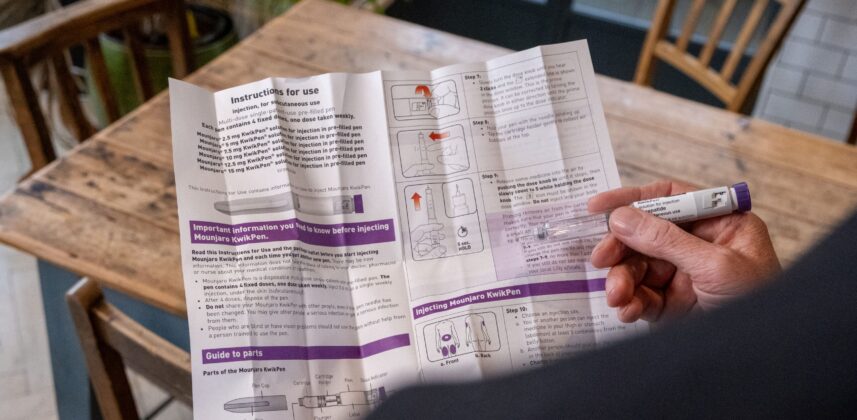Long-term effects of GLP-1 and GIP weight loss drugs like Mounjaro and Wegovy to keep an eye on
Robert Price | Last update: 4th September 2025
GLP-1 weight loss drugs, like Wegovy and Mounjaro, have changed the landscape of obesity care. While most people experience only short-term side effects such as nausea or constipation, questions remain about the long-term picture. As millions of people stay on these treatments for years, researchers are studying both rare risks and potential protective benefits.
This article isn’t here to scare you, it’s about setting out the facts: what we know so far, what’s uncertain, and which symptoms you should never ignore. Everyone’s health is different, and the key is weighing up risks against benefits with your doctor or healthcare provider. The bottom line is that serious conditions are rare.

Why long-term data is still emerging
GLP-1 receptor agonists (like semaglutide and liraglutide) have been used for type 2 diabetes since 2010, giving us useful safety data. But using higher doses for weight loss is more recent, and the population taking them is broader, often younger, with fewer other health conditions.
Because of this, researchers are still learning what the true long-term effects may be. Large population studies suggest some rare risks, but also major health benefits such as lower risk of heart disease and possibly dementia (Medical News Today). Regulators such as the UK’s MHRA also highlight the need for monitoring, particularly around digestion and procedures requiring anaesthesia (Gov.uk).
What researchers are monitoring
Digestive System
Since GLP-1 and GIP drugs act mainly on the gut, this is where most signals appear:
- Gastroparesis (very slow stomach emptying): Symptoms include bloating, vomiting undigested food, feeling full quickly.
- Pancreatitis: Severe abdominal pain radiating to the back, nausea, vomiting. Rare but serious.
- Gallstones/gallbladder inflammation: Often linked to rapid weight loss. Pain usually comes after fatty meals.
Kidneys and Liver
- Kidney function: Dehydration from vomiting or diarrhoea may worsen kidney injury. Watch for reduced urination or swelling.
- Liver: Rare reports of hepatitis or abnormal liver tests. Symptoms include jaundice, dark urine, fatigue.
Heart and Circulation
Positive data suggests reduced risk of heart attacks and strokes. However, some people may see a higher resting heart rate or, rarely, arrhythmias. Symptoms like chest pain or palpitations should never be ignored.
Mental Health
There are mixed reports. Many people feel more confident as they lose weight, but rare cases of low mood or suicidal thoughts have been flagged. Always seek urgent help if you feel persistently low or unsafe.
Long-term risk–benefit snapshot
We’ve created a detailed infographic to show what long-term studies and population data are suggesting. It highlights where risk may be higher (rare but important to know) and where risk may be lower (potential protective benefits).
| GLP-1 & GIP weight-loss drugs (Mounjaro, Wegovy) | |
| Long-term signals to know about | |
| (Based on large-scale observational studies; associations ≠ causation. Always consult your doctor.) | |
| Higher Risk | Lower Risk |
| (Rare but important to monitor) | (Protective associations) |
| Digestive / Pancreas | Heart & Brain |
| Gastroparesis (stomach paralysis) | Heart attack (myocardial infarction) |
| GERD (acid reflux) & gastritis | Cardiac arrest |
| Pancreatitis | Heart failure |
| Bowel obstruction | Ischaemic & haemorrhagic stroke |
| Kidneys | Dementia & Alzheimer’s disease |
| Kidney stones | Seizures |
| Interstitial nephritis | Blood & clotting |
| Dehydration-related kidney injury | Deep vein thrombosis (DVT) |
| Heart & Circulation | Pulmonary embolism |
| Hypotension (low blood pressure) | Chronic phlebitis & pulmonary hypertension |
| Syncope (fainting) | Coagulopathy |
| Musculoskeletal | Anaemia |
| Arthritic disorders / joint pain | Respiratory |
| Bone pain, tendinitis, myalgia | Pneumonia, bronchitis, COPD |
| Neurological / sleep | Respiratory failure |
| Headaches | Pleural effusion |
| Sleep disturbances | Infections |
| Procedures & surgery | Lower risk of bacterial infections |
| Aspiration risk during anaesthesia (due to delayed gastric emptying) | Reduced rates of septicaemia/sepsis |
| Mental health & behaviour | |
| Reduced risk of alcohol, cannabis, opioid & stimulant misuse | |
| Lower risk of bulimia | |
| Fewer psychotic disorders | |
| ⚖️ Most people will never experience serious side effects. Balance risks against benefits with your doctor or healthcare provider. SlimrChat community support can help you share experiences and stay informed. | |
What this means for you
- Most users never experience severe side effects. But being aware of red flags helps you act early.
- Stay in touch with your doctor or healthcare provider. Ask about routine tests and symptom checks.
- Don’t ignore signs. Severe abdominal pain, jaundice, swelling, palpitations, or low mood should trigger a medical review.
- Balance perspective. Risks exist, but benefits are often bigger – weight loss, better heart health, reduced diabetes risk.
- Lean on community. Many SlimrChat members say sharing experiences makes side effects feel less isolating.
For everyday support, see our Managing Your Side Effects hub.
The balance of risk vs reward
The real picture is not one-sided. GLP-1 and GIP drugs carry rare risks, but for most people the benefits outweigh them. They not only support weight loss, but also reduce risks of serious diseases.
It’s about balance, awareness, and ongoing support, and SlimrChat is here to help you with all three.
TL;DR
- Rare risks: digestive problems, pancreatitis, gallstones, kidney stones, arrhythmia, mood changes.
- Protective benefits: lower risks of heart attack, stroke, dementia, infections, and substance misuse.
Everyone’s health is different — weigh risks vs benefits with your doctor.